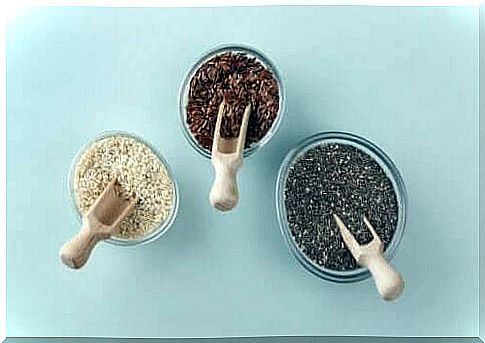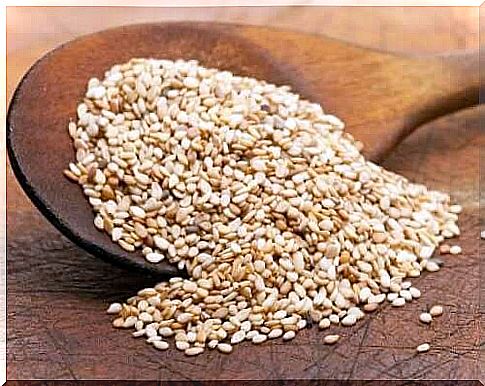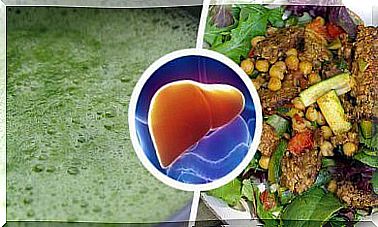Nutritional Value Of Sesame Seeds

Sesame seeds ( Sesamum indicum ) are derived from a plant growing in Africa and India. They began to spread around the world with the slave trade, as slaves preferred to travel with their own meals with them to make sure they got sesame seeds anywhere. In this article, we will tell you what different types of sesame seeds exist and what is the nutritional value of sesame seeds.
These high-protein seeds contain significant amounts of unsaturated fatty acids and important minerals such as iron, zinc and calcium.
Different types of sesame seeds
Black sesame seeds

Black sesame seeds have the same nutritional value as whole sesame seeds, but are also rich in antioxidants. They are used in the manufacture of baked goods, because when these seeds are roasted or ground, they give off a very good aroma and also have a strong taste. These seeds are used to make high quality sesame oil.
Whole or unpeeled sesame seeds
The nutritional value of whole sesame seeds is better than that of light, peeled seeds. Among other things, they contain eight times more calcium than white seeds.
Products made from unpeeled seeds, such as butter and Tahini, tend to be darker and bitterer.
Pale sesame seeds
Light sesame seeds are used in the manufacture of cakes, breads and other baked goods and give the food crispiness.
About 50% of their weight is oil. They are an important spice in China and Japan and give the meal a delicious taste and aroma. These seeds also stimulate digestion and contain many nutrients.
Nutritional value of sesame seeds

Protein
Although sesame seeds do not contain all the essential amino acids, they are high in protein. When combined with cereals, they provide good protein of biological value. One good trick to do this is to add a few seeds to the breakfast muesli.
Nutritional value of sesame seeds: fats
Essential fatty acids (Omega-3 and Omega-6) are the most important ingredients in these seeds. These fatty acids are very important and beneficial to health.
They are called essential fatty acids because our bodies cannot make them themselves, that is, they must be taken with food. These fatty acids are extremely important for the cardiovascular system as they lower blood pressure and reduce the risk of arterial disease.
Nutritional value of sesame seeds: carbohydrates
One notable property of sesame seeds is that they are high in fiber, a kind of carbohydrate.
Fiber is an essential nutrient for intestinal health as it cleanses waste from the intestinal walls.
Nutritional value of sesame seeds: vitamins
Sesame seeds are rich in B vitamins (B1, B3, B6 and folic acid). These vitamins are important for healthy skin and tissues and promote heart and muscle function.
They also contain a significant amount of vitamin E, one of the most antioxidant vitamins, with the ability to reverse the harmful effects of free radicals.
Minerals
Sesame seeds contain numerous different minerals such as phosphorus, potassium, magnesium, zinc and so on. Most notably, they are one of the best sources of calcium.
For this reason, children, menopausal women, and pregnant women should eat sesame seeds.
Benefits of Sesame Seeds

Eating sesame seeds regularly benefits the body in many different ways:
- They protect the cardiovascular system. This is because the polyunsaturated fatty acids they contain improve arterial health, thus reducing the risk of high blood pressure, heart attack, and heart-related chest pain, among other ailments.
- Sesame seeds benefit people with diabetes. Studies show that regular use of sesame oil lowers blood pressure and blood sugar in diabetics with high blood pressure.
- They may help relieve depression. This is because they contain a significant amount of an amino acid called tryptophan, which is a precursor to serotonin. Serotonin suppresses stress, anxiety, insomnia, depression and lack of energy.
- Sesame seeds reduce the risk of osteoporosis because they contain significant amounts of calcium.
- They keep the body healthy. Their antioxidant vitamins and minerals keep the immune system in top tune and fight free radicals.
- They may protect the digestive system due to the fiber they contain. This protects the mucous membranes and prevents their irritation (catarrh, heartburn, etc.).
- Sesame seeds may improve oral health. According to traditional Indian medicine Ayurveda, holding or spraying sesame oil in the mouth for a few minutes prevents the formation of cavities, gingivitis, plaque, and bad breath.
Sesame seeds have great nutritional value, so they are worth adding to your diet. Also, be sure to eat a balanced diet and exercise regularly!









